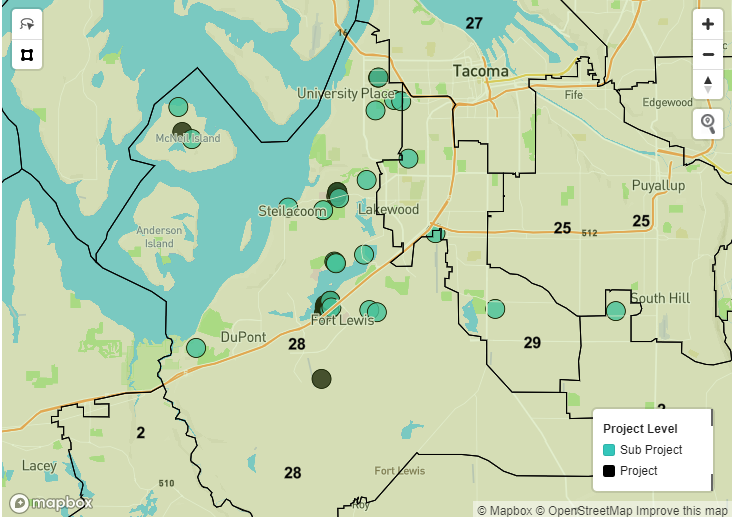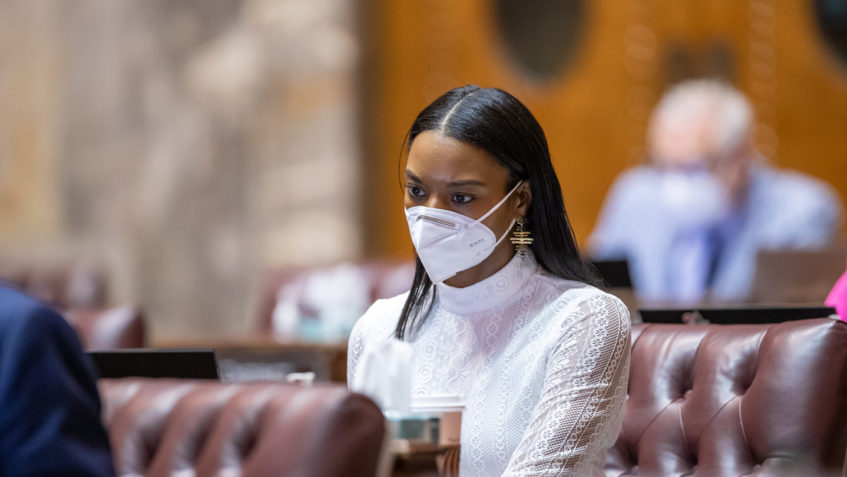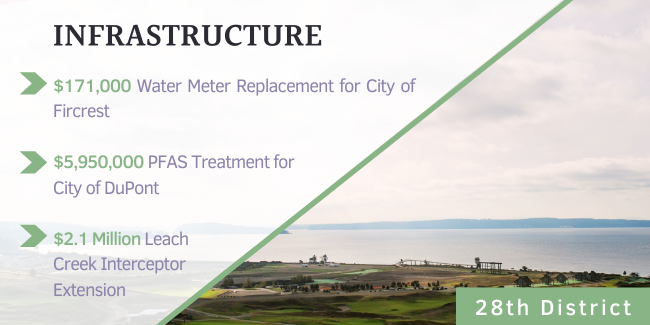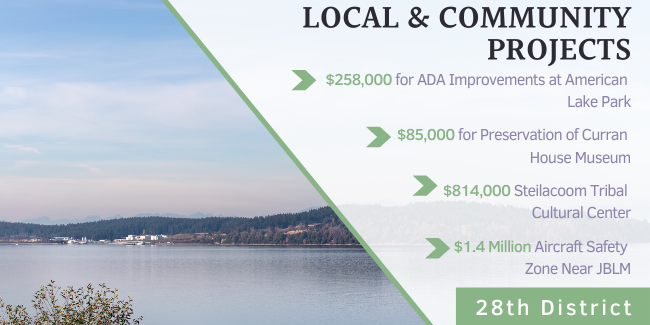Dear Friends and Neighbors,
We have officially adjourned the 2021 legislative session, and I’m honored to share that my first session in the State Senate has concluded with historic accomplishments and successes for our district and for Washingtonians at large. Though the remote session and the ongoing pandemic proved challenging, we finished the session on time and passed a budget that puts people and community first. I am grateful for the opportunity to serve the community members that make up the 28th District and am continually honored to have the opportunity to represent our community.
Town Hall 
I’m excited to invite you to another Virtual Town Hall coming up on Tuesday, May 18, at 6:30 pm. I will be joined by my colleagues, Representatives Mari Leavitt and Dan Bronoske. This will be our opportunity to share what we’ve accomplished this session, answer your questions, and hear your thoughts. You can submit questions live during the event or ahead of time at this link. The event will stream live on Facebook, YouTube, and Twitter.
The Legislature has adjourned. Now what?
Being in the legislature provides the opportunity to learn and relearn about our legislative process. I am excited to share and answer any questions you may have.
For example, did you know that the Washington state legislature operates on a two years cycle? That means that when we begin next session in January 2022, the second year in this biennium, legislation that was introduced this year but did not make it through the deadlines required for advancement could be reconsidered.
Or, that the Washington State Legislature is part time, and that the number of days in the regular session changes depending on the year? For example, in an odd numbered year, such as 2021, the regular session is 105 days. In even-numbered years, such as next year, the regular legislative session is 60 days. That means that all new laws, changes to existing laws, and budget enactment must occur during the 105- or 60-day window. If legislative work has not concluded by the end of that period, a special session must be called.
To learn more about the legislative process in Washington State, click here. If you’re interested in learning about the process by which an idea becomes a law, check out my event with Senator Das and Representative Taylor, where we went over “How to Track a Bill” earlier this session.
Have any questions about the legislative process? You can reach my office at T’wina.Nobles@leg.wa.gov.
A HISTORIC BUDGET THAT PUTS PEOPLE FIRST
The pandemic not only challenged our existing structures and programs, but also highlighted inequities that exist statewide – across areas such as childcare, policing, broadband, housing, and taxes. This provided a unique opportunity, however, to focus on recovering and at the same time building a stronger district and state. We focused on passing policies to not only address inequity, but to fundamentally reform systems for every Washingtonian to have an opportunity for success.
Our historic $59 billion budget, Senate Bill 5092, invested in Washington families in critical ways:
- The Working Families Tax Exemption, a sales tax rebate, will put $500-$950 annually back in the pockets of nearly half a million working families and taxpayers,
- The Temporary Assistance for Needy Families program received a 15% increase in funding which will allow more families to access the critical program during times of high statewide unemployment,
- Equity training for educators and students received additional funding which will give educators the tools to rebuild a school system where all students feel welcomed and can thrive,
- And the Fair Start for Kids Act makes a historic investment in childcare and early learning that will address the lack of affordability and accessibility to these programs for families across Washington.
Not only will these investments and policy changes make our communities stronger now, they will result in long-term financial stability and resilience for generations to come.
We also passed a $2.2 billion pandemic response bill in February. A few of the investments made with this funding included:
- Rental assistance,
- Vaccine distribution,
- And aid for schools to resume in person learning.
Finally, I’m honored to share that I had the opportunity to champion numerous community and city projects that will see investments coming straight to the 28th District. This includes local investments in public health, public safety, infrastructure and community development. See the projects we were able to secure funding for below.
To view all the capital construction budget projects that will benefit the 28th, click the image below.

SUCCESSES THIS SESSION
I am honored to have the opportunity to serve the 28th legislative district, and am proud of what I’ve accomplished on behalf of the community during this first session. In addition to critical investments for the community, I was able to champion seven pieces of legislation, five of which have made it through the legislative process. Four of these pieces of legislation have been signed, and I am excited to celebrate the fifth in the coming week. The final two pieces of legislation had the opportunity to become items funded in the budget.
- Senate Bill 5448 would have created a payment plan for the annual vehicle registration. I know that many community members are struggling with the annual car tab fee, and I am passionate about finding relief. Through the legislative process we learned that this issue is very complex , with many different needs that require attention. Thus, we discerned that a work group will give us the time and expertise to find the best possible solution for the community. This workgroup was funded in the transportation budget and will convene over the next year. I look forward to working with community members to find financial relief.
- Senate Bill 5292 offered legislation to evaluate the use of parks and recreation spaces, trails, and facilities in the design of a parks Rx, or parks prescription, pilot program. This pandemic has shown us that now more than ever folks need the opportunity to get outside. This pilot program, created in collaboration with the health care and insurance sectors, would offer a wellness program to community members to both help control the cost of healthcare and get more folks connected to the healing benefits of the outdoors. This pilot program was funded through the operating budget as opposed to becoming legislation.
- The following bills that I prime sponsored have been signed into law by the Governor:
- Senate Bill 5184 requires each public school to designate a contact for students experiencing foster care to coordinate services and resources.
- Senate Bill 5293 allows a sentencing court discretion on whether a mental health sentencing alternative should be imposed. It provides treatment instead of criminalizing people for having a mental illness, thus making our communities safer by addressing the underlying cause of some crime.
- Senate Bill 5321 eliminates a pledge requirement for the College Bound scholarship and auto-enrolls qualifying students who are eligible. This bill strikes the balance between upholding our promise and increasing access for students.
- Senate Bill 5183 provides survivors of domestic violence strangulation the medical assistance and justice they need.
- There is one remaining bill to be signed into law by the Governor:
- Senate Bill 5259 will allow for data collection on the use of force by police. With the passage of this legislation, we have an opportunity to increase transparency and build trust by providing public access to information about the use of force.
RESOURCES
Tenants and Landlords
- The Washington State Limited Landlord Relief Program offers owners of four or fewer rental units/properties that make less than the Median Family Income the ability to recuperate up to 80% of unpaid rental payments. Click here to apply.
- Eviction Resolution Pilot Program
- Find a comprehensive list of information regarding statewide rent assistance and homelessness prevention programs by clicking here.
Vaccination Resources
As of May 13th, Washingtonians over the age of 12 are eligible to receive a vaccine. I’m feeling hopeful about seeing everyone in community soon. In the meantime, we must continue to be diligent about wearing masks in public, practicing social distancing, and refraining from large social gatherings with people outside our immediate households. Even after receiving a vaccine, people should still follow best practices – including mask wearing. If you’re still looking for a vaccine appointment, here are some helpful resources:
- Check out the State’s vaccine finder tool to find healthcare providers and pharmacies with vaccine appointments
- The Tacoma-Pierce County Health Department populates a list of upcoming walk-up vaccine events in the county. Click here to view upcoming events
- Need help finding a vaccine? Sign up for the Tacoma-Pierce County Health Departments Vaccine Help List here, or call 253-649-1412, 8 a.m. to 4:30 p.m., 7 days a week
- For COVID-19 Information Hotline, dial 1-800-525-0127, then press #. Language assistance is available.
- Note: while Washingtonians over the age of 12 are eligible to receive a vaccine, some of the vaccines remain age restricted.
REAL ID Enforcement Deadline Extended
When the REAL ID Act goes into effect, Washington residents will need more than a standard diver’s license to travel by plane domestically. While the deadline for REAL ID enforcement was initially set for October 1, 2021, it has been extended to May 3, 2023 due to COVID-19. This extension will provide community members with additional time to ensure they have a REAL ID compliant document for domestic flights. Learn more here.
Emergency Broadband
Broadband access is a critical issue in our communities, and I am excited about the work we were able to do this session to expand access. House Bill 1336 and Senate Bill 5383 have both been delivered to the Governor. If signed into law, they will expand access by allowing public entities to directly deliver internet access to our communities.
For those who could benefit from immediate assistance, the Emergency Broadband Benefit is a federal program that will provide a discount of up to $50 per month towards broadband service for eligible households and up to $75 per month for households on qualifying Tribal lands. Eligible households can also receive a one-time discount of up to $100 to purchase a laptop, desktop computer, or tablet from participating providers if they contribute more than $10 and less than $50 toward the purchase price. To learn more, determine if you are eligible, and apply, click here.
Ways to Get Connected
Did you know that you can reach out to your legislators to get help with navigating government agencies and local resources? This session our office was honored to assist the community with issues such as unemployment, rental assistance for tenants and landlords, healthcare, veterans’ affairs, vaccine access, and more. Reach out to my office at T’wina.Nobles@leg.wa.gov or by calling 360-786-7654 and we’ll be happy to help!
Get involved in the process
- Learn—How a bill becomes a law, from start to finish, is explained here.
- Find—Look up legislation on the issues important to you here.
- Watch—Visit TVW.org for broadcasts and archived videos of your democracy in action.
- Reach out—If you do not live in the 28th Legislative District, you can find and contact your legislators here.
As always please, reach out to my office for any questions or comments. You can also find me on Facebook and Twitter to receive updates about the work we are doing for you.
Sincerely,
Senator T’wina Nobles





